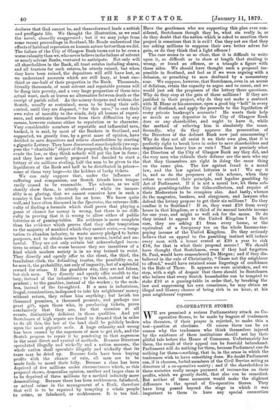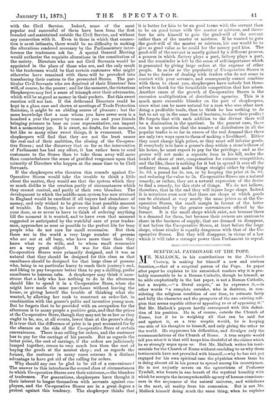with the Civil Service. Indeed, some of the most popular
and successful of them have been from the first founded and maintained outside the Civil Service, and without any connection with it. Even in those in which that connec- tion is mast intimate, there would be no difficulty in making the alterations rendered necessary by the Parliamentary inter- ference the tradesmen ask for. A special General Meeting would authorise the requisite alterations in the constitution of the society. Directors who are not Civil Servants would be appointed in the place of those who are, and the only result to the tradesmen would be that certain customers who might otherwise have remained with them will be provoked into transferring their custom to the persecuted Stores. The par- ticular Civil Servants who are deprived of their Directors' fees will, of course, be the poorer; and for the moment, the victorious Shopkeepers may feel a sense of triumph over their adversaries, which will be as good as money in their pockets. But this sweet emotion will not last. If the dethroned Directors could be kept in a glass case and shown at meetings of Trade Protection Societies, it might be an abiding source of pleasure ; but the mere knowledge that a man whom you have never seen is a hundred a year the poorer by reason of you and your friends bringing pressure to bear on your representative, can impart but a momentary joy. It is sweet, no doubt, for the moment, but like so many other sweet things, it is evanescent. The shopkeepers will find that they are not the least nearer the real end of their ambition, the closing of the Co-opera- tive Stores ; and the discovery that so far as the intervention of Parliament has had any effect, it has rather been to send customers to the Stores than to take them away will more than counterbalance the sense of gratified vengeance upon that minority of Directors who happen at the same time to be Civil Servants.
If the shopkeepers who threaten this crusade against Co- Operative Stores would take the trouble to think a little about the matter, they would see that the system which they so much dislike is the creation partly of circumstances which they cannot control, and partly of their own blunders. The development to which the middle-man system has now attained in England would be excellent if all buyers had abundance of money, and only wished to be given the least possible amount of trouble. In theory, to have every kind of shop close to your door, so as never to have to think of ordering anything till the moment it is wanted, and to have even that moment suggested or anticipated by the watchful care of your trades- man, approaches as near as possible to the perfect life for busy people who do not care for small economies. But then there are in the world a very large number of persons who are not at all busy, who have more time than they know what to do with, and to whom small economies
are a very great object. It was for this class that Co-operative Stores were primarily designed, and it was as natural that they should be designed for this class as that omnibuses should be designed for that large class of persons who, being in no particular hurry to reach their journey's end, and liking to pay twopence better than to pay a shilling, prefer omnibuses to hansom cabs. A shopkeeper may think it mon- strous that a lady who has nothing to do in the afternoon should like to spend it in a Co-operative Store, when she might have made the same purchases without leaving the house, or giving herself the trouble of thinking what she wanted, by allowing her cook to construct an order-list, in combination with the grocer's polite and inventive young man. But he forgets that to be provided with an occupation for the afternoon is to many people a positive gain, and that the prices at the Co-operative Store, though they may not be as low as they ought to be, are, at all events, lower than at the grocer's shop. It is true that the difference of price is in part accounted for by the absence on the side of the Co-operative Store of certain conveniences. There is no calling for orders, and the customer has to pay for the carriage of his parcels. But as regards the latter point, the cost of carriage, if the orders are judiciously lumped together, comes to very much less than the cost of buying the goods at the nearest shop ; and as regards the former, the customer in many cases esteems it a distinct advantage to have got rid of the calling for orders.
Why should any one be glad to be rid of a convenience ? The answer to this introduces the second class of circumstances to which Co-operative Stores owe their existence,—the blunders of tradesmen. For generations, shopkeepers have thought it their interest to league themselves with servants against em- ployers, and the Co-operative Stores are in a great degree a protest against this tendency. The shopkeeper thinks that
it is better for him to be on good terms with the servant than to be on good terms with the master or mistress, and there- fore he sets himself to gain the good-will of the servant rather than of the master or mistress. If he wanted to gain the good-will of the master or mistress, his cue would be to give as good value as he could for the money paid him. The good-will of the servant is mostly gained by a different process, a process in which flattery plays a part, bribery plays a part, and the remainder is left to the sense of self-importance which is generated by giving large orders at the expense of other people. In so far as the popularity of Co-operative Stores is due to the desire of dealing with traders who do not come in contact with your servants, and consequently cannot combine with them to cheat you, shopkeepers have nobody but them- selves to thank for the formidable competition that has arisen. Another cause of the growth of Co-operative Stores is the excessive multiplication of distributive agencies. This is a much more excusable blunder on the part of shopkeepers, since what can be more natural for a man who sees other men doing a profitable trade, than to think he has nothing to do but to set up in the same line of business, to share their profits ? He forgets that with each addition to the divisor there will be a diminution in the quotient. In the present case, there can be no question that the number of distributors in all the popular trades is so far in excess of the real demand that there are only two ways open to them of making a livelihood. Either they must charge high prices, or they must sell inferior goods. If everybody is to have a grocer's shop within a stone's-throw of his house, he must expect to pay for the privilege ; and as the grocer will not make a separate item in his bill, under the heads of share of rent, compensation for ruinous competition, and the like, there is nothing for it but to spread it over all the ordinary items, and make things straight either by charging 3s. Gd. a pound for 3s. tea, or by keeping the price at 3s. Gd. and reducing the value to 3s. Co-operative Stores are a natural remedy, or rather, they are a natural expression of the desire to find a remedy, for this state of things. We do not believe, therefore, that in the end they will injure large shops. Indeed it is notorious even now that there are shops at which goods can be obtained at very nearly the same prices as at the Co- operative Stores, the small margin in favour of the latter being balanced by the greater conveniences offered by the former. It is the small shops which exist, not because there is a demand for them, but because their owners are anxious to share in the business of supply, that are doomed to disappear, if not before the Co-operative Stores, at least before the large shops, whose rivalry is equally dangerous with that of the Co- operative Stores. But they will disappear, in virtue of a law which it will take a stronger power than Parliament to repeal.







































 Previous page
Previous page